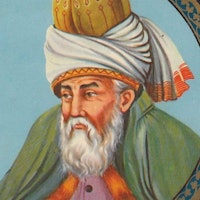We have fallen into the place where everything is music… Open the window in the center of your chest, and let the spirits fly in and out.
Jalaluddin Mevlana Rumi

Where Everything Is Music
Topic: Creativity, Culture, & the Arts
WHERE EVERYTHING IS MUSIC
Don’t worry about saving these songs!
And if one of our instruments breaks,
it doesn’t matter.
We have fallen into the place
where everything is music.
The strumming and the flute notes
rise into the atmosphere,
and even if the whole world’s harp
should burn up, there will still be
hidden instruments playing.
So the candle flickers and goes out.
We have a piece of flint, and a spark.
This singing art is sea foam.
The graceful movements come from a pearl
somewhere on the ocean floor.
Poems reach up like spindrift and the edge
of driftwood along the beach, wanting!
They derive
from a slow and powerful root
that we can’t see.
Stop the words now.
Open the window in the center of your chest,
and let the spirits fly in and out.
Jalāl al-Dīn Muḥammad Rūmī (born September 30, 1207, in Balkh, present-day Afghanistan – died December 17, 1273, in Konya, present-day Turkey) is revered as one of the world’s greatest poets, mystics, and spiritual teachers. Known in the West simply as Rumi, he was born into a family of scholars and mystics who fled westward during the Mongol invasions, eventually settling in Konya, then part of the Seljuk Empire. Under the guidance of his father, Bahāʾ al-Dīn Walad, Rumi was trained in Islamic theology, jurisprudence, and the contemplative disciplines of the Sufi path. His early years reflected the classical model of a scholar-saint—rooted in devotion, study, and service to his community.
Rumi’s life was transformed by his meeting with the wandering mystic Shams of Tabriz around 1244. Their profound spiritual companionship awakened in Rumi a passion that transcended formal learning and opened him to the depths of divine love. When Shams mysteriously disappeared, Rumi’s grief became the flame that illuminated his poetry and devotion. From this crucible emerged the Mathnawī, often called the “Persian Qur’an,” a six-volume masterpiece that weaves stories, parables, and reflections into a vision of love as the animating force of all creation. His shorter lyric poems, collected in the Divan-e Shams-e Tabrizi, sing of longing, union, loss, and the ecstatic dance between the soul and the Beloved.
Rumi’s teachings centered on the transforming power of divine love, the unity underlying all faiths, and the inward journey from self-centeredness to God-centeredness. He taught that every experience—joy and sorrow, presence and absence—serves as a mirror reflecting the divine mystery. After his passing, his followers established the Mevlevi Order, known for its sacred whirling as a form of remembrance (dhikr). Across eight centuries, Rumi’s voice has transcended language, culture, and creed, inviting seekers into the stillness of the heart where the human and divine meet in love.
Where Everything Is Music
Rūmī Jalāl al-Dīn. Rumi: Selected Poems. Translated by Coleman Barks, Penguin, 2004. [Mevlana Jalalu'ddin Rumi].

Jalaluddin Mevlana Rumi
Theme: The Musical Arts
Copyright © 2017 – 2026 LuminaryQuotes.com About Us

Jalalu’ddin Mevlana Rumi
Jalāl al-Dīn Rūmī (Jalalu’ddin Mevlana Rumi) was born on September 30, 1207 C. E. in Balkh Province, Afghanistan, then on the eastern edge of the Persian Empire. Rumi descended from a long line of Islamic jurists, theologians, and mystics, including his father, who was known by followers of Rumi as “Sultan of the Scholars.” When Rumi was still a young man, his father led their family more than 2,000 miles west to avoid the invasion of Genghis Khan’s armies. They settled in present-day Turkey, where Rumi lived and wrote most of his life…
Hazrat Inayat Khan
Coleman Barks